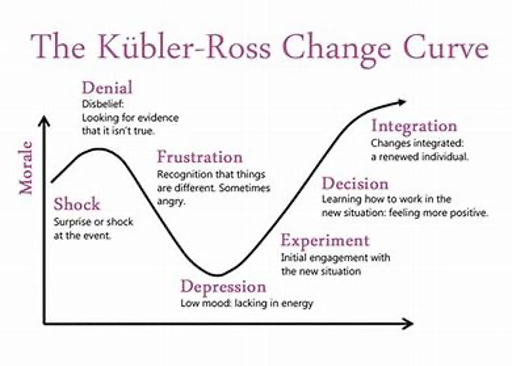Jo Farn is the new Programme Director for the System and Leadership Development Programme of the West Yorkshire and Harrogate Partnership. Jo was one of the earliest members of our Improvement Academy Quality Improvement Training Network and we are sharing an extract from her blog.
What a time to join the partnership! I was looking forward to a three month induction – meeting people, listening to what they were working on, understanding how I could support them. Put simply getting to know them and building trust and relationships. Doing all of this over the phone or via zoom never figured in my plan, in fact I didn’t know what zoom was until last week (NB it’s a way of talking to people through your laptop via a video link). This current context has prompted me to think about how leadership, behaviour and learning ‘show up’ in a crisis.

 We are all currently moving through uncertain times, on a steep learning curve, trying to get to grips with our new ‘normal’ whether that is undertaking a different focus at work, working from home, not working, home schooling, social (physical) distancing or some combination of all of them. The roles we do across our partnership are all ultimately about looking after other people. In this current climate of GOLD command and crisis management, it’s all hands to the pump to ensure safe and speedy discharge of people from hospital, ensuring our vital business as usual services function and working towards increasing our critical care capacity. With this all in view it’s very easy to fall into a trap of forgetting to care for ourselves and each other during this challenging time. But this context makes it all the more important to be kind to ourselves, as well as each other; it’s the old adage about putting your own oxygen mask on first before helping other people.
We are all currently moving through uncertain times, on a steep learning curve, trying to get to grips with our new ‘normal’ whether that is undertaking a different focus at work, working from home, not working, home schooling, social (physical) distancing or some combination of all of them. The roles we do across our partnership are all ultimately about looking after other people. In this current climate of GOLD command and crisis management, it’s all hands to the pump to ensure safe and speedy discharge of people from hospital, ensuring our vital business as usual services function and working towards increasing our critical care capacity. With this all in view it’s very easy to fall into a trap of forgetting to care for ourselves and each other during this challenging time. But this context makes it all the more important to be kind to ourselves, as well as each other; it’s the old adage about putting your own oxygen mask on first before helping other people.
In a bid to keep this simple, I wanted three key things to help look after ‘you’ and each other….I’ve ended up with five….
- Laugh out loud! This is serious business….laughter generates neurotransmitters (happy hormones) which reduce stress. Prolonged periods of stress are not good for our cognitive ability, decision making and immune system. Seek out what or who makes you laugh and design it into your day.
- Recognise and value other people. This is another neurotransmitter releaser….include colleagues, pull them in, ‘see’ them and their work, ask how you can help them and how they can help you.
- Be aware of your leadership style; what’s it like to be on the receiving end of you? No matter what role we do, we are all leaders; we all have the potential to influence a situation or another person. Our context will require a more directive style for some tasks – but ensure it’s balanced with a good amount of supportive and coaching behaviour by asking questions and listening to understand.
- Be kind. During times of stress micro-aggressive behaviours such as rudeness, not listening, and interrupting might show up. These incivilities impact on the recipients by reducing their decision making ability and making them less likely to help others as well as adversely impacting their wellbeing.
- Forgiveness. Like me, you may be reflecting that you’ve displayed some of these behaviours in the last week; so my final tip is to be kind to yourself; forgiveness is important, acknowledge the behaviour, apologise, forgive yourself and move on. This is key to resilience; the ability to ‘bounce back’.
As the weeks progress, we will all go through a learning and development journey about ourselves and our response to Covid-19. My final ask is to reflect on this learning and capture it. We’ve been part of transformation in the last two weeks that would have taken months if not years to achieve….take a moment to reflect on how you’ve moved as a person, how your team have embraced change, how your service or organisation has achieved the seemingly impossible in the last two weeks and beyond. Consider the positive things that have emerged, what things could we leave in the past, what learning and improvement we could take into our future?
What is becoming clearer in these unprecedented times is the opportunity for role modelling the behaviours we want to see and the chance to learn is also unprecedented and could set us up for impact that propels our Partnership way beyond the transformation that we aspire to achieve.